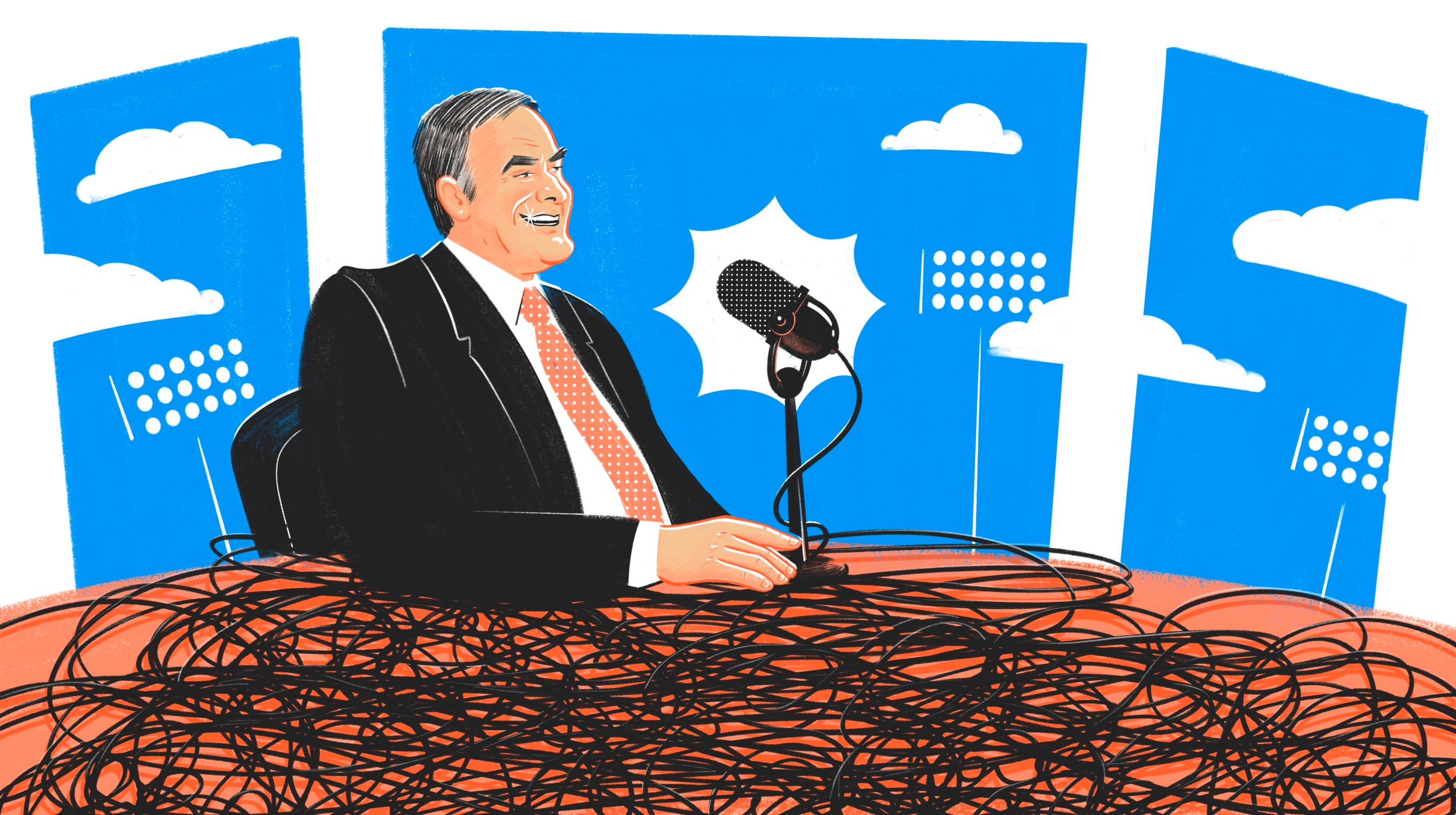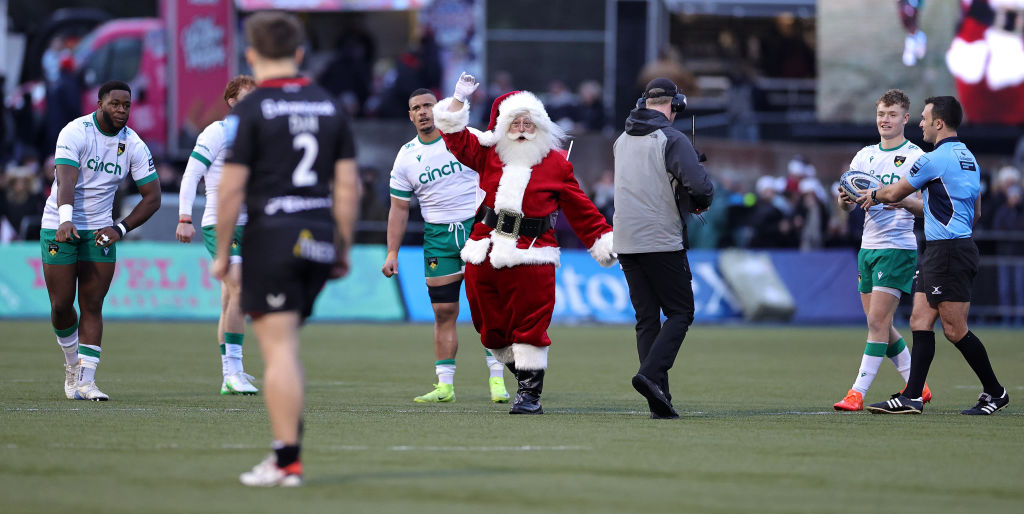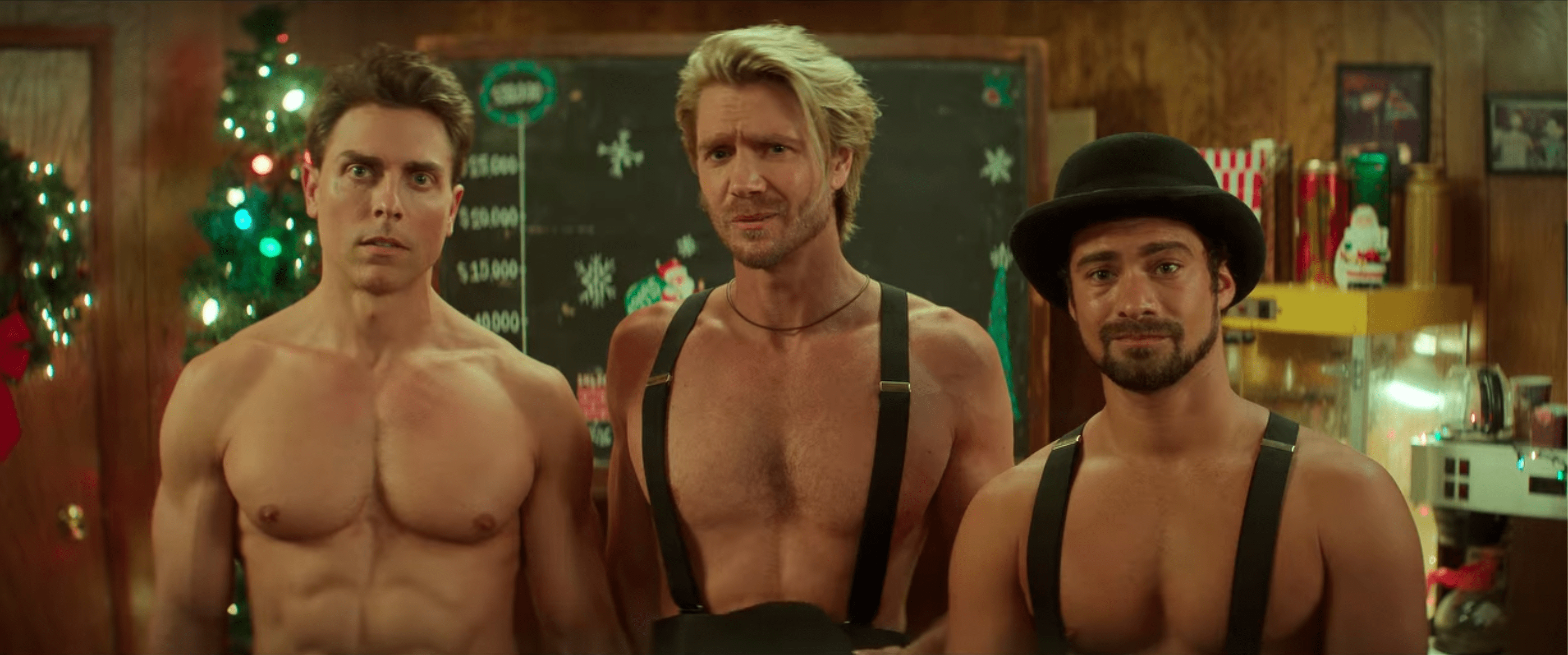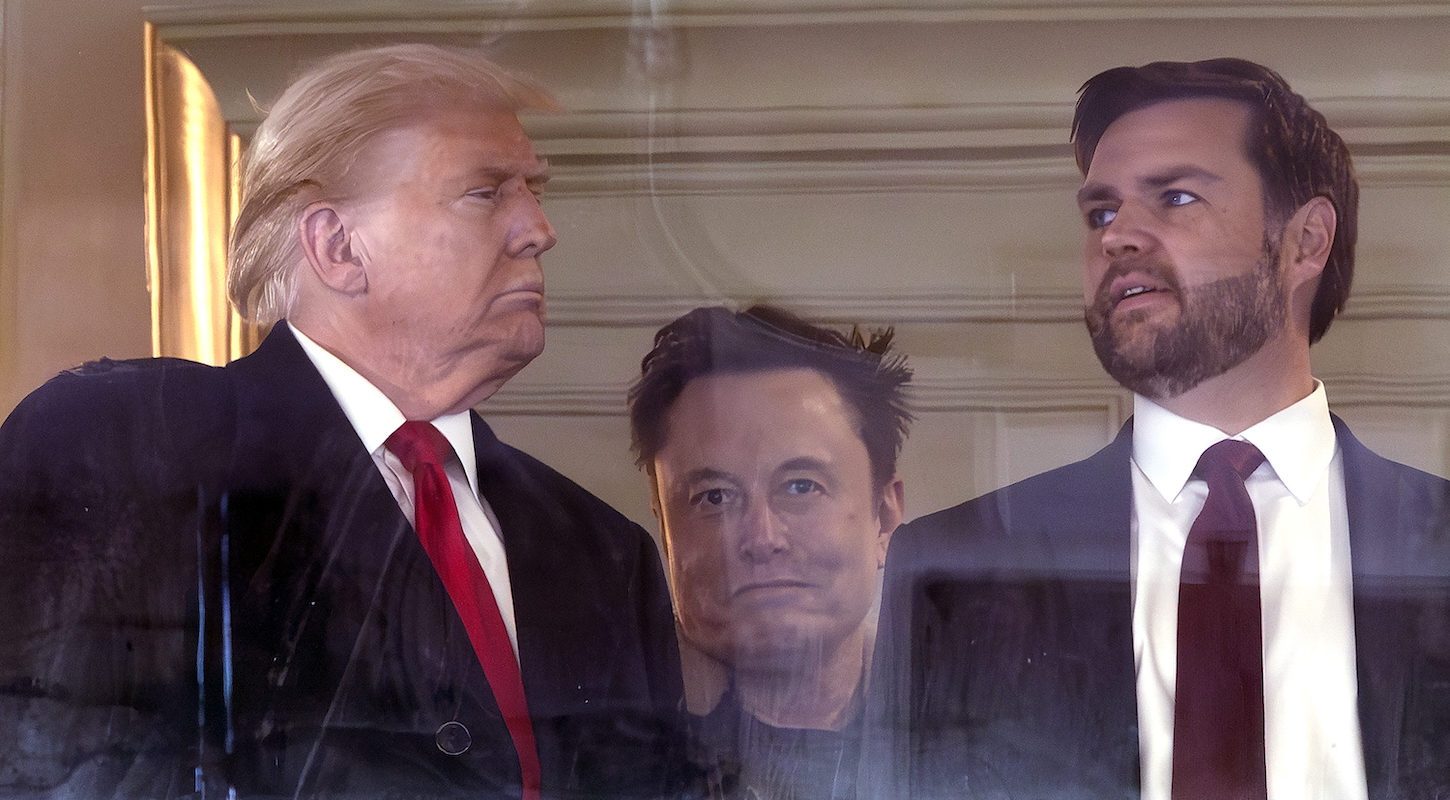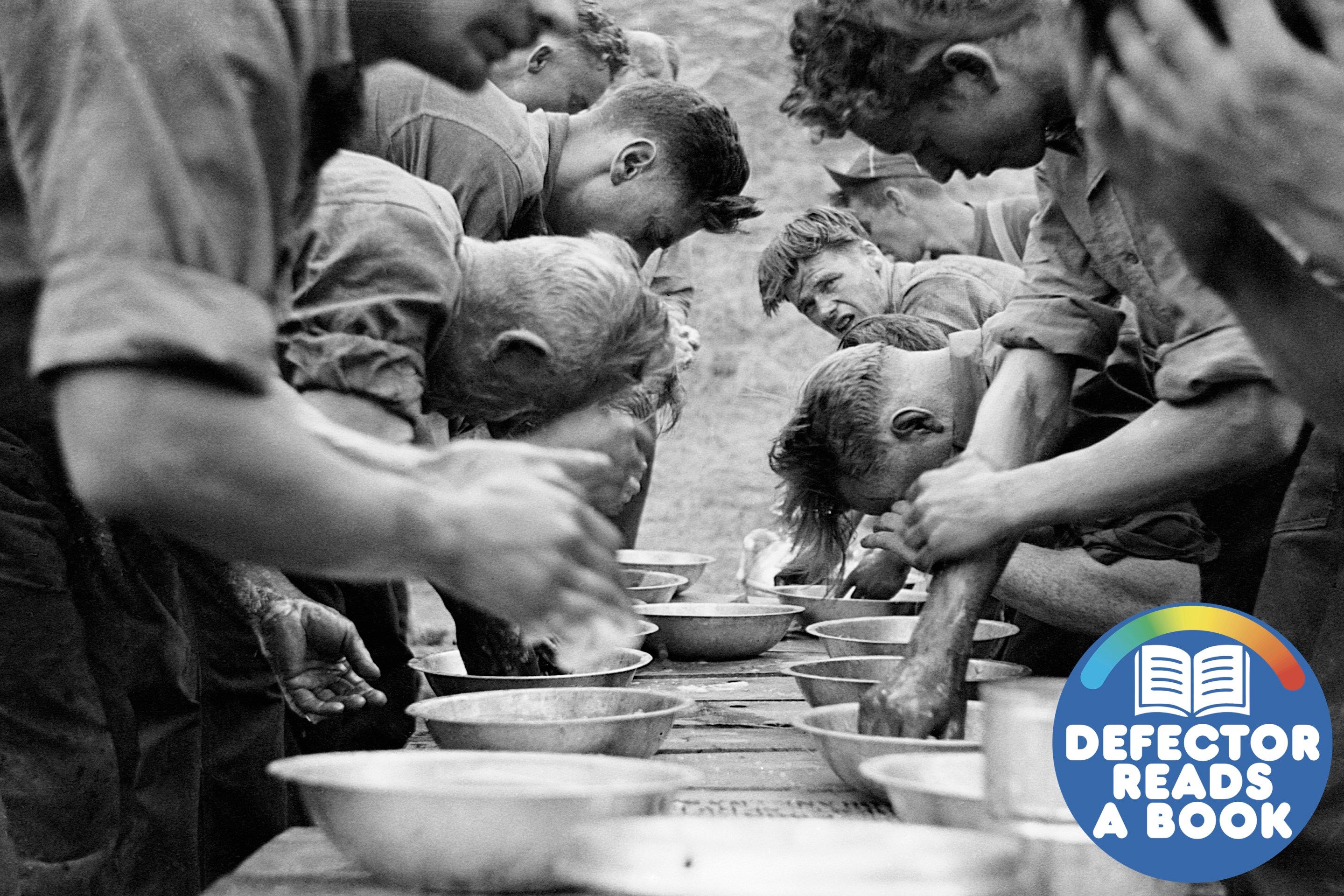Al Michaels has never eaten a vegetable. This has been reported before, but I'm here to tell you it's absolutely true. Growing up, Al refused to eat them and was never forced to because, even back then, being Al Michaels had its privileges. Al’s mother, who was 18 when she gave birth to him, indulged her son by frying him up cheap cuts of steak and lamb chops instead. His wife of 54 years, Linda, tried to get him to eat vegetables early in their marriage, but told me she quickly ruled it a lost cause.
So I suppose it’ll be up to me to get the man to do it.
This will not prove easy. Originally, I had planned to meet Al for breakfast at a restaurant called Farm Shop in Santa Monica, but he nixed that spot right away.
“Anything called the Farm Shop, you ain't going to get my ass in there." At 75, Al Michaels remains frightened of nouveau farm-to-table luxuries like Farm Shop's roasted broccoli di ciccio with pickled peppers. He requires comfort food.
Shit, Al Michaels IS comfort food. No other human being has been on national primetime TV as long or as often as this man. His signature call—“Do you believe in miracles? YES!!!!!”—came when I was three years old, in a sport that Al had barely ever called at the time and has rarely called since. My entire life as a sports fan has been scored to the voice of Al Michaels, and I am hardly alone. He is one degree from the Miracle on Ice, from Scott Norwood’s miss, from the 1989 World Series earthquake, from O.J. Simpson, from John Madden, from Philly Special, from Blair Walsh, from Dick Button, from the Odell catch, from Malcolm Butler picking off Russell Wilson, and probably from your wedding. The man is an institution, and a long-enduring one. This is not necessarily a good thing to be during the Trump Presidency, in which millions of Americans, myself included, have been forced to wonder out loud if we need institutions of any kind.
Now that’s a lot to digest. So let’s eat, shall we?
We're at the in-house restaurant of Shutters in Santa Monica. Much safer menu for the old man. It’s summer 2019. Al is clad in casual grandpa attire of jeans and a button-down, his trademark underbite and thick hands as familiar in person as they are on your TV. Walking into the dining room, Al rejects the first table offered to us by a solicitous maître d'. I know this move well, because my own mom perfected it long ago and I’ve taken to it ever since. Having to sit by, like, the bathroom door can ruin a meal.
Al is fresh off of surgery for spinal stenosis, so he has to walk and sit gingerly. He also has a handicap placard for his car: a black Mercedes convertible that counts as mandatory for residents of his Brentwood neighborhood. When we get to our proper table, he needs two cushions placed atop his chair so he can sit comfortably.
“Can you give me another pad?” he asks our host. “I need some height here.”
“Yes, sir.”
They bring him a third cushion.
“These chairs are a little low. I’m down here in the bowels, in a manner of speaking. You know what? Believe it or not, another cushion.”
Four cushions and he's finally at ease. I order a coffee, black. Al orders coffee with cream and two Sweet & Lows, plus a glass of orange juice.
“Is the orange juice full of pulp?” he asks our waiter.
“No.”
“Perfect.”
You can’t abide pulp?
“No. Pulp is horrible.” In your mind, listen to Al Michaels say the word in that voice of his: a '50s Brooklyn accent that is now so obscure it counts as a dead tongue. Harr-ribble. “It's the texture of it. I like smooth stuff. I need a smooth evenness.”
The funny thing about Al’s phobia—and there are many funny things about it—is that he appears to be shockingly ignorant of his dining options outside of the produce aisle.
“I want you to tell me your favorite kinds of sandwiches so I can call my wife and she can figure this thing out,” he insists. We’re talking lunch during breakfast. This is my kind of person.
I do love mortadella.
“Mordella?”
No, morTAdella. It looks like bologna, but it's got, like, pistachios.
“Oh, you're kidding me.” He's never heard of it.
More attentive waiters keep refilling our glasses that I end up having to piss way too often. I ask one of them for eggs Benedict with a side of bacon. My order inspires Al in an instant.
“Fucking eggs Benedict. Damn. That sounds good. Do you know what? Bring me eggs Benedict, no vegetables. Sometimes it comes with asparagus and all that stuff.”
The waiter assures Al that the dish is a traditional eggs Benedict with Canadian bacon and ham. This pleases him greatly.
I call Lupica and I go, 'Mike, what the fuck is this?' I know I've got to get even with this prick."
Al is happy, which means I can pry more hot food takes out of him. Yes, there are other things I need to ask Al Michaels: about the NFL, about bullshit public stadium deals, about his personal friend Bob Kraft’s bust for illegal handjobs, and a great many other things. But first, I wanna find out how deep his pathological fear of vegetables goes.
If a burger comes with a leaf of lettuce, do you throw the lettuce into the woods?
“I have them re-plate it.”
You do?
“I don't want to have the residue. Sometimes, the lettuce might leak a little bit.”
Isn’t that residue just water?
“I understand, but it's touched it.”
Dealing with Al is like dealing with my old man. They’re both in their 70s. They both got married when they were very young, and have remained married for over half a century. They’re both conservative but with easy-to-locate soft spots. They’ll both do dad-style scat singing while trying to figure out a conference call (“Let’s see here... Bup bup baa bup bup baa...”). And there comes a time when it’s simply not worth trying to explain certain things to either man in full. Thanks to my folks, I have a good amount of experience in abandoning lines of conversation that I know will lead me to a dead end. So I give up on the vegetable thing.
For now.
The history of Al Michaels is the history of sports in America. He was born and raised in Brooklyn. His mom Lila routinely busted him and his friends out of school to take them to the horse track. His old man took him to Brooklyn Dodgers games at Ebbets Field, where he watched Jackie Robinson. Al was six years old the first time he saw Robinson play. He didn’t grasp the magnitude of what Robinson had achieved. Seven decades later, he may not still fully grasp how Robinson himself felt about it. What he remembered most about those trips to Ebbets Field were the colors. The immaculate, emerald grass. The Dodgers uniforms, which Vin Scully perfectly described as “wedding cake white.” The bright signage. The tawny infield dirt.
“I remember walking in, and holy mackerel, this is breathtaking.”
The Dodgers moved to L.A. in 1957. The Michaels family, with 13-year-old Al in tow, followed suit just a year later, leaving Al Michaels as one of the few New Yorkers of his era who was pleased with Walter O’Malley’s decision to uproot a beloved local franchise because the city wouldn’t gift him a new stadium. For little Al, moving in tandem with the Dodgers was a bit of good luck. For grown-up Al, the form of modern stadium grift that O’Malley helped pioneer remains less a crisis and more a tribute to the entrepreneurial visions of the billionaire class.
“The one thing that I find to be absurdly disingenuous,” he tells me, “is when a candidate comes out and demonizes the one percent. I know some billionaires, and they are for the most part incredibly philanthropic. Hundreds of millions of dollars into schools, hospitals, whatever. The same candidates show up and raise money from these people.”
This is one line of conversation I’m NOT gonna abandon with him, because he’s so close to getting it. But first, you and I have to understand how Al Michaels came to be one of our more prominent billionaire-sympathizers in the first place.
Thanks in part to his call of the USA’s upset victory over the Soviet Union in the 1980 Olympics, Al became the voice of every other sport in existence. That includes Major League Baseball, minor league baseball, golf, cycling, boxing, Olympic figure skating (“You get dressed up in a tuxedo. You're not announcing the sport. It's not a game. I found the thing to do with figure skating is to shut up. What's there to talk about?”), college football, the NFL, and even the NBA, which Al called at David Stern’s insistence back in 2003, despite Al being a “reluctant participant,” at least until ABC offered him a shitload of money for the job.
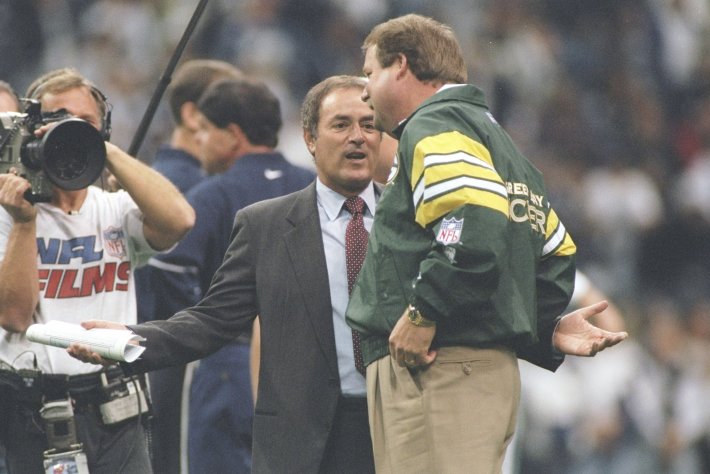
Thanks to his Zelig-like existence across every major sport, Al Michaels has stories in his quiver: good, rich stories that he can tell over and over again. This is because they always work, because Al knows how each story works, and because he knows he’s the one telling it. So let’s hear a few.
There was the time screenwriter William Goldman—you know him as the man who wrote The Princess Bride—dismissed Al as a guy who never says “anything you remember” in a book Goldman had co-written with braying donkey Mike Lupica.
“This is like frickin' eight years after the Miracle On Ice. I call Lupica and I go, ‘Mike, what the fuck is this?’ I know I've got to get even with this prick.”
It took over a year of occasional stewing for Al to exact his vengeance upon Goldman. Finally he spotted an opening during a Monday Night Football game between the Giants and Niners in 1990: a preview of that season’s NFC title game that ended up being a 7-3 shitfest. The camera fell on Bill Parcells and Al took advantage.
“I said, 'A lot of people are asking Bill these days to compare his '86 team with this team.' Then, I said, ‘You might as well ask him to compare William Shakespeare to William Goldman.’ Dan Dierdorf looks over me and he goes, ‘Fucking amazing.’"
Did you ever hear from Goldman after that?
“Hell, no. Never.”
There was the time Al was about to call a World Series game when a fucking earthquake hit.
“The game wasn't going to start till like 5:20 something, but most of the people were in the stadium. Remember, that stadium was a piece of shit. Terrible. The worst ever. Cheaply constructed. If the upper deck had collapsed on the lower deck, it would have been the biggest disaster in the world, because you would have had thousands of deaths. Thousands.”
It can haunt you.
“It did for a little while. There's no question it did.”
Al describes enduring that quake (“There’s a flow to them. San Francisco was a very lateral quake”) in similar terms to the way he describes calling a game. Everything is feel and rhythm. When he calls a game, he wants to match the crowd. If the crowd is abuzz, he’s abuzz. When the crowd is lifeless, well then, that’s when Al starts talking about the point spread. Unlike the Joe Tessitores of the world, Al promises he’ll never try to sell you a lemon.
That hasn’t stopped fans, me included, from complaining about his work on the air. Sometimes Al’s audible disenchantment with a game can lapse into outright inattention. He’s heard that criticism, along with every other strain of it. So I ask him, how do you know these days what's a valid, usable criticism from viewers and what isn't?
“Because I think I know better than they do. I can feel it. Nobody knows more than I do. Nobody. I can feel it.”
How do you know you know?
“Everybody wants to be in the loop and inside, and the one thing I learned in football and doing the games is, I'm in the loop. And I always could feel the game. If the game is shitty, I'll try to make it more interesting, but I won't do it with my voice as if, 'Wow. Third and four. This is gigantic!'”
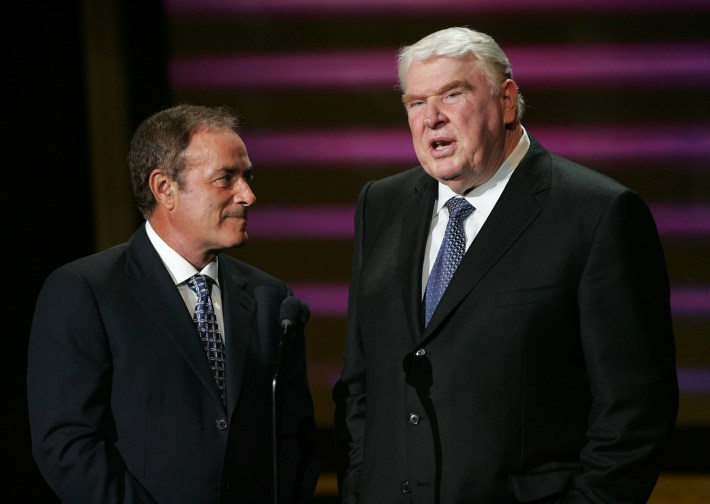
Then there was the time when Dick Vermeil told Al—a latent Rams fan who cheered for them in their desultory Super Bowl loss to the Patriots, because he wasn’t working the game—that former Rams coach Mike Martz used to burn both his coach’s challenges every game ON PURPOSE.
“He would challenge two plays in the first four minutes of the game to get rid of the challenges. He didn't want to be burdened. He wanted to think about his offensive game plan.”
That's nuts.
“Of course it was.”
And then there was the time Al’s colleague and friend O.J. Simpson almost certainly murdered his ex-wife Nicole Brown and Ron Goldman.
Al still lives in the bucolic Brentwood neighborhood where Simpson himself lived back in 1994. They are hardly the only luminaries to have called this place home. “Living here, I see people,” Al tells me. Bob Iger lives nearby. Rob Reiner lives nearby. LeBron, too. Fergie, whom Al only knows as “the Black Eyed Peas lady,” lives just blocks away. We’re walking together through this neighborhood right now, and there are no sidewalks here. That’s a feature, not a bug. Los Angeles proper is home to four million people, but also to a sizable celebrity population WITHIN that population that has to gerrymander secluded clusters of infrastructure—replete with hedges 10 feet high—that keep gawkers away. This part of Brentwood is one such cluster. Engineered to be quiet. Private. Seductive.
Simpson no longer lives here. He can’t afford it, and he’s no longer welcome within its confines. Al knew Simpson well enough at the time of the murders that the late ABC News anchor Peter Jennings had Al call in during the infamous Bronco chase to shed light on O.J.’s frame of mind, which led to Al famously debunking a Howard Stern prank call live on the air to a duped Jennings. After Simpson surrendered to the police, Al visited him in jail three times.
Look, if somebody had not committed a double murder, you would be banging on the plexiglass screaming, 'THIS IS BULLSHIT.'"
What made you visit O.J.?
“Well, he was a guy I knew and was friendly with. The timeline never made sense to me. I've driven by the murder site. It's on a street that has a fairly good amount of traffic. The houses are very close to one another. I'm going, ‘Linda, there's a murder in cold blood, and no dogs are barking and no people to see it or hear it?’”
What puzzled Al even further was that Simpson was in a rush to get to the airport that night for a flight to Chicago. He made the flight, was spotted by Muhammad Ali's photographer Howard Bingham, and had a conversation that Bingham told Al was the same as any other conversation those two had ever had with one another.
“So that gave me pause.”
In retrospect, you could read those events as disturbing in another way.
“Well, you could. Certainly, in retrospect. But at that point, to think that you could possibly know somebody who could commit a double murder is, in a way, unfathomable. This is the murder of the century. It's people I know. That's why I tried to give him the benefit of the doubt before all the facts came in.”
Did you ask him point-blank if he did it?
“No. I don't know what I would have gotten for an answer. I would have gotten an amorphous answer, I'm sure. He kept saying, ‘How can they think I did this?’”
But he didn't deny it.
“Look, if somebody had not committed a double murder, you would be banging on the plexiglass screaming, ‘THIS IS BULLSHIT.’ Instead, it was all about, ‘How can they think I did this?’”
Do you think he did it?
“Now? Yes.”
You had been out with him and his wife a few times. You saw no indication of a—
“No. No. I know that people have said that they saw violent arguments and all that stuff. We weren't at the house enough. We were at the house at certain parties or events or whatever. I never saw anything that would remotely resemble that.”
Well, I don’t think America did, either.
“That's what made it so unbelievable.”
The fact that Simpson lived in this affluent, otherwise peaceful neighborhood only added to the enigma. It’s hard to imagine ANYTHING bad happening here, which makes it easy to see why homeowners in Brentwood register initial shock and disbelief when it does.
The house where Al and Linda live has been their home for 34 years now. It’s a sanctuary, with a backyard swimming pool and a foyer you could walk through on a pair of stilts. When they bought this house, a large portion of the backyard was occupied by, naturally, a vegetable garden. That had to go. “I couldn't find the match quickly enough.”
Al and I share lunch on his brick patio, with Linda bringing out cold cuts, bread and some cursory sandwich fixins. Al and Linda met when they were in 10th grade. They were friends at first, only to become something more thereafter. They’ve never come remotely close to splitting up, and they’re so at ease around one another that it’s obvious to any visitor that theirs is a marriage of equals.
In 1988, SI writer Franz Lidz visited this same patio to interview Al for a profile that Al ended up hating, in part because he felt like Linda was portrayed as a Stepford Wife in it. “Fucking—we're trying to make it a nice day for the guy! She's got the camembert and the brie. Get the fuck out of here! That was a weird piece.”
So, I will tell you right here that Linda Michaels is NOT a Stepford Wife. She’s a Cowboys fan, which is arguably far worse.
“Just being friends with the Joneses and how they make us feel,” Linda explains. “You can't but help be a fan.”
OK, I promise her, I won't say mean things about the Cowboys right now. (But now that I’m back home: Fuck the Cowboys.)
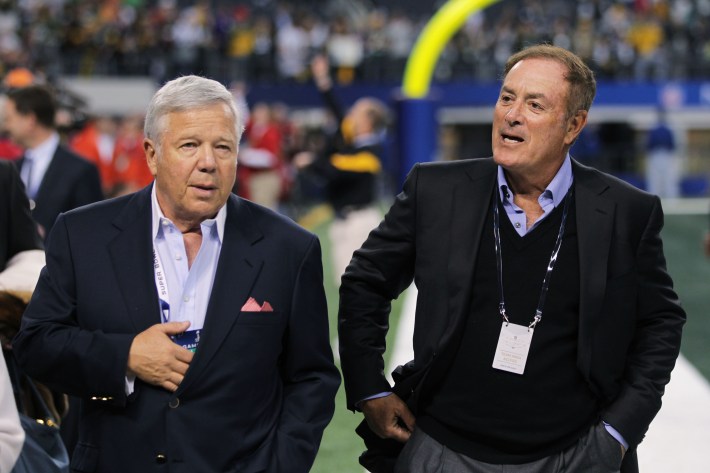
Al and Linda have two kids between them and multiple grandkids, none of whom play football. If it were up to Al, those grandkids wouldn’t play football until they were at least in high school, and they knew as much as there was to know about the dangers of the sport. I ask him if the NFL, as presently constituted, has an ethical right to exist.
“I think they're trying to make football as safe as they can, there's no question. If I felt that they were not as intent on making it as safe as they do, then I would really be conflicted. We know what the game is. It's like a train wreck. But nobody forces a kid who's in the NFL now to be a football player. They've chosen to do this. And hey, people are entertained by it. I look at MMA. How does that get licensed? I don't get it.”
Al and Linda DO have a hockey-obsessed 13-year-old grandson, though. As with Al and his vegetables, Linda has given up on trying to rein in yet another stubborn Michaels family member. I know what it’s like to try to wrangle headstrong children, and I know the agony of attempting to dissuade them from doing something they genuinely love, especially if that thing they love isn’t, like, shooting heroin. So I’m not really inclined to disagree with Al and Linda on much of anything right now. It’s just too goddamn nice out. You can see how residing somewhere so comfortable for so long might tempt one to bask in a lofted reality that is only occasionally, if ever, disrupted by the horrors of the outside world.
But those horrors do exist, and the NFL that Al serves as lead singer for is both tied to those horrors and, in some instances, a perpetrator of them. Patriots owner Robert Kraft got caught receiving a happy ending at the Orchids of Asia parlor a few months prior to Al and me meeting in L.A. for the first time. Al is friends with Kraft. This isn’t unusual for him. Like he said, the man knows some billionaires. I ask Al how he felt when his buddy Bob got busted.
“Surprised. Like everybody else. The day before the Kraft thing breaks, I think, is the Jussie Smollett thing in Chicago, right? There was a press conference where the police superintendent got up there. More ribbons on his chest than General Patton at the end of the war. He did not want to get off the stage. Now you got the [Kraft] thing and this is on national television. I think there's an embarrassment factor here. You make it a national deal and it's not what you're making it out to be. It's an embarrassment thing for the prosecution, in a way. Very random and rash speculation on my part, but I think the guys may had watched the Smollett thing the day before. Everybody wants to be famous.”
Does your relationship with Kraft color your ability to talk about him on the air?
“I don't think it will. The one thing you want to do is get the facts straight.”
And Larry Baer, who you also are friends with, just got reinstated as owner of the San Francisco Giants after being suspended for a domestic altercation caught on video.
“Look, you lose your composure. Everybody does it at a certain point. You and I both know people and they get into hot water. There's an empathy. I mean, there really is. If you don't know Jeffrey Epstein, you just think he's the biggest creep that ever lived, right?”
I do.
“I've known Kraft for years. I've known Larry Baer for years. Is it a one-off moment? You think it isn't. It probably is. People just want to jump on people. They just want to kill them.”
But aren't the empathy scales usually too far tipped in favor of the perpetrator instead of the victim?
“I get what you said because it’s a multi-sided situation. Let’s say Kraft was found guilty. He has paid as big a price as anybody has ever paid for a misdemeanor because he’s been raked over the media coals for a long period of time. There’s an embarrassment factor and some people are able to get through it. Robert gets through it because he’s very strong-minded.”
Kraft eventually had a team of white-shoe lawyers not only get his charges dismissed, but to also keep the video of his handjob sessions from becoming public. I guess you could call that being strong-minded. But Kraft is Al’s friend, so he gets the benefit of Al's doubt. Same with Jerry Jones, who in March 2019 invited Al to moderate a gathering of Cowboys sponsors at the team’s practice facility. Al agreed. I asked Al if his NBC bosses knew about this junket.
“They don't care.”
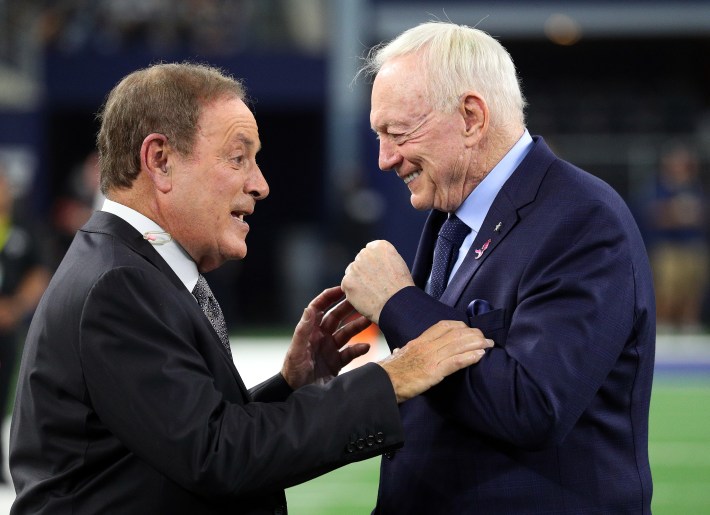
This is how Al knows more than you and I. There are “insiders” like Adam Schefter and Albert Breer polluting the NFL, but Al is in a tier of insiderdom that resides so far above even that group that he barely has to mention it. He’s practically an owner as the league’s caste system goes. Few people have the profile, the charm, and the wile to pull off that kind of trick. Al does. In fact, when Jones bought the Cowboys in 1989 and cleaned house, it was Al who approached Jones cold and offered his unconditional support.
“I sidled up to Jerry and said, ‘Look, you're taking all this shit in Dallas for firing Tom Landry. I've been going down there for the last three years, and every newspaper article I read says it's time for Landry to leave. Tom Landry is too old. You just did what they all want you to do, and now, you're taking all the shit.’ That was our first-ever conversation.”
This is how Al gets exclusive intel prior to games. It’s how he ended up breaking the news, 25 years prior, that Jones had brokered an outside deal with Nike to sponsor the Cowboys and the Cowboys only, permanently altering the NFL economic landscape and making the Rooney family’s collective asshole tighten to the size of a pinhead. Jones planted that story with Al, who then dutifully relayed it to the public. Everyone at the top was comfortable with this, and remains so. That will prove true even a year from now, when a pandemic will have swept the nation, emptied out practically every stadium in North America, and tested Al’s ability to match the crowd in the extreme.
For now though, I remain all too charmed. The first time Al ever emailed me, and he did so out of the blue, he wrote “Al Michaels here” as the subject line. The first time I ever spoke to him on the phone, he also greeted me by saying “Al Michaels here,” just as he greets you for the opening of a Sunday Night Football telecast. It’s a smart way of making his presence known, be it in person or via other forms of contact. It’s an effective icebreaker. It settles the question of whether or not you’re interacting with that Al Michaels, because you are. He wants all those formalities out of the way. He wants you to be as comfortable as he is.
I am. Through the day, ours is a conversation dripping with the kind of opulent civility that would make a coal lobbyist cream his pants in delight. We are both men of considerable means (his means being far more considerable, of course), so we’re engaging in a light ideological tussle that people in more dire straits don’t have the luxury to practice. It’s possible that Al is working me, although I am not exactly someone with the kind of power that invites big names to come schmooze. Thus, I feel special and terribly fond of Al as a result. As first man-dates go, it’s been a fantastic one. And we haven’t even had dinner yet.
New Orleans is overrated, beyond comprehension."
Ah, but Al has a plan for dinner. He takes me to Capo in Santa Monica. He comes here so often that they know his order in advance ($30 crab torta for the app, $86 New York strip for the entrée). I top him and get the $88 Kansas City steak, which is ALSO a New York strip but somehow different enough to warrant a titular relocation. This is the kind of joint that has truffles on the menu in abundance, and guess what? Al LIKES truffles.
“I like those because it's not a vegetable.”
It's like a mushroom though, isn't it?
“It's a different mushroom. They're special.”
Al orders a drink while I sip on seltzer and dutifully pat a joint in my jeans pocket that I bought from a dispensary the night prior. I figured if I couldn’t get Al to eat some eggplant, maybe he’d take a hit off my joint in an obvious celebrity-profile stunt. But a couple hits, possibly with Don Nelson, back in the day were enough for him. Another story: Al and Nelson were at a get-together in Hawaii where guests were invited to honor a mutual friend's last wishes by smoking his ashes.
Did Nelson smoke the ashes?
“I wasn't there for the whole thing, but I know that was Don laughing. I didn't know who was smoking what.” Or whom!
Al himself refused the corpse blunt. Since then, he’s stuck to liquor. Tonight, Al has a vodka cocktail to start, and then wine with dinner. He can clearly handle his mud better than his late colleague, the legendary Howard Cosell, could in his twilight. Cosell used to drink so much vodka that the hotel bar would run out of it.
Howard didn't scare you off vodka?
“Once he was gone, I picked up the baton.”
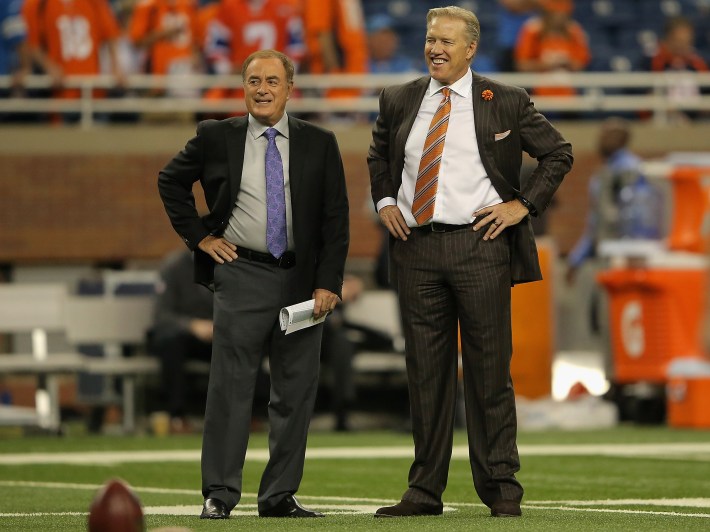
One of my coworkers had asked me to ask Al to defend his pronunciation of New Orleans. If you’ve heard him say the name on the air, you know that he says it, New Or-lee-uns. Or used to.
“You know what? The actual pronunciation is New Or-lee-uns. I was told by people that. I got so much shit for it, I'm back to the two syllable Orleans. I figured, ‘What do I need this shit for?’ I used to be told by a lot of locals, ‘Hey, we appreciate the fact you pronounce it the way it should be pronounced,’ and that's great.”
No word on if those locals were very big strong men who came to Al with tears in their eyes. But if they were, they would not appreciate Al’s greater opinion of the town.
“New Orleans is overrated, beyond comprehension.”
Food-wise?
“Everything-wise. I certainly liked it a lot better after they built the casino.”
We are now shooting the shit as flawlessly grilled slabs of meat arrive at the table and Al, on reflex, surgically removes the parsley from his side of cubed potatoes.
What do you think of Roger Goodell’s tenure?
“I think it's probably a mixed bag.”
That leads us to Ray Rice.
“There was an early video that didn't show the whole thing, but there was some video just after the incident that did surface. Both indicate he just had a terrible night. And [Janay Palmer] asked for leniency, as much probably for her as for him maybe. I don't know. That's got to play on what Goodell was feeling in regard to what he's going to do with the suspension. The other thing too, Drew, which really pissed me off about that whole thing… Where were the charges? At what point does Roger Goodell have to become America's sheriff?”
I don't like when he does that.
“I know! They asked him to be the sheriff because where was the county attorney, the prosecutor? Where were the charges? Where? Now, Goodell has to come in, and he's got to be the judge and the jury. Where was law enforcement?”
Throughout his answers, Al says, “It’s crazy!” a lot. It’s an easy, generic way of commenting on matters without REALLY getting too deep into them. Because, as a steward of the NFL, Al can’t and won’t go too deep. But also, and this is something I feel in my bones: Getting too deep into the incredible clusterfuck that is 21st-century America will make YOU feel like the crazy one, instead of the other way around. Al tells me he avoids that stress whenever possible. Hence, no Twitter feed, no Instagram, none of that shit. It’s a nice way of living. You can opt out of social media when you're Al Michaels and just telling people you're here is all the introduction you require.
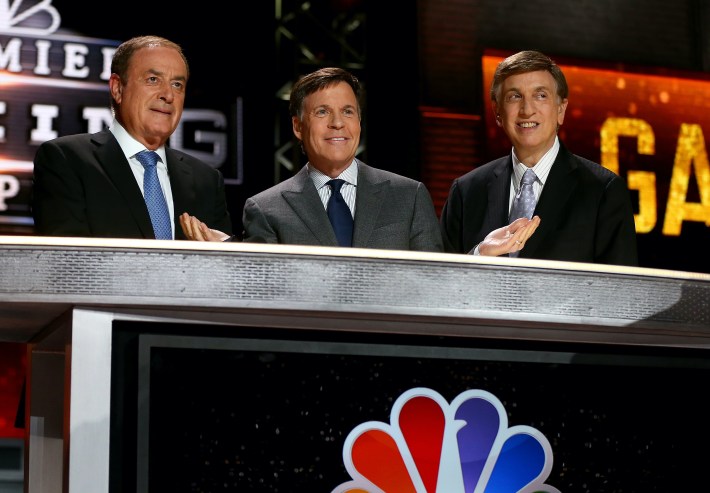
We talk about Dennis Miller. Miller was hired by ABC in the most notable example of the network trying to recreate the Cosell years by throwing an interloper into the booth. Why Miller ended up failing isn’t much of a mystery; he was constantly trying to adorn the telecast with his patented bespoke references despite having limited dead-air time to deploy them. And, as Al notes, the key to a comedian’s delivery is in their facial expressions, and ABC wasn’t about to cut away from game action just so you could see Dennis Miller’s smarmy visage.
Finally, and this is more interesting, Dennis got starstruck. Current SNF head man Fred Gaudelli, who was in charge of Monday Night Football during the Miller era, told the press that Miller should never have been in pre-production meetings with coaches and players. Al tells me why Gaudelli felt that way.
“Dennis walks into these pre-production meetings like a kid with the Topps football card collection seeing his collection coming to life. He's blown away that these are not cartoon characters anymore. Also, the league wasn't crazy about him.”
Miller had grown too comfortable with the players and coaches he had been hired to roast, but, simultaneously, failed to make the viewers at home comfortable. He had made all the wrong people uneasy. Al Michaels, who remains the best play-by-play man in football, has never had a similar problem.
You can sit there and bitch and moan about all this stuff or you can accept it and say, 'OK, we're going to make the best of this.'"
We polish off our meal, split an alarmingly large tab, and walk out into the welcoming cool of L.A. at night. Al wants to drive me to my hotel, which is less than a 10-minute walk away. He’s worried that it’s not safe for me to get there on foot along the mean streets of... Santa Monica.
I refuse the offer. Then I walk back to my hotel and smoke a fatty. It’s been a good day.
We’re now nut-deep into 2020 and good days are at a premium. Al has survived the COVID pandemic by swimming in his pool, taking walks with a fully healed spine, and playing lots of golf. (Please hear that word as gall-uph, in Al’s voice.) All is well in Alworld. It usually is.
I talk to Al on the phone three times during the pandemic, first before the NFL season is set to begin, and then after he’s done his first pair of games in Kansas City and in L.A., and then after the incident with the mask. There is no preseason. No Hall of Fame Game for Al and Cris Collinsworth to get their sea legs. In 2020, Sunday Night Football has to start off with real games, most of them staged in empty stadiums.
Those vast swaths of empty seats are but the smallest consequence of a nation that is, as we speak, paying a horrifying price for its leaders and industrial titans dining off the fat of the land. Two hundred thousand American deaths and counting. Tens of millions of jobs lost. Nazi-ass cops openly beating protestors they’ve been charged with protecting. An impossible number of bars and restaurants and small businesses, all gone forever.
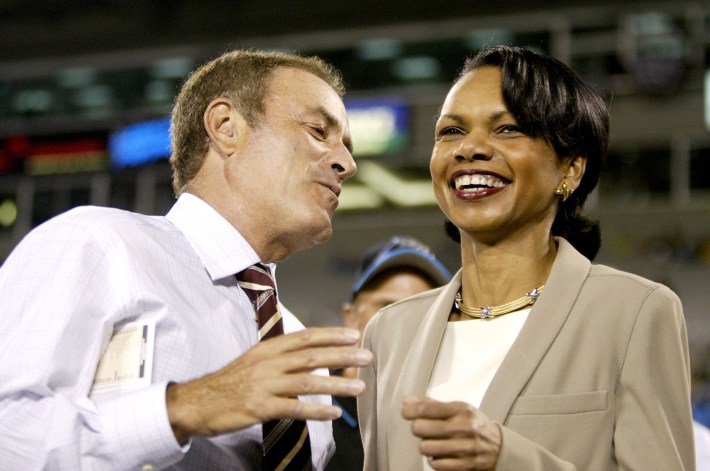
In the middle of all this, the NFL remains determined to stage its season wire-to-wire, without distraction. Al is doing these games live at the stadium, without a partition to separate him from his color man. He’s getting tested for COVID routinely and flying private to every game to stay relatively isolated on the road. Normally, Al doesn’t give a rat’s ass about doing preseason games. But this time, he wanted a warm-up, because the number of on-site people NBC uses for production has dropped, by his estimate, 25–30 percent.
Al is sanguine about having to adapt. “Is that a perfect situation? Of course it's not, but it's what we have to live with right now. You can sit there and bitch and moan about all this stuff or you can accept it and say, 'OK, we're going to make the best of this.'”
That’s a great attitude to have, but it’s not one that most people can AFFORD to have. Personally, Al has not suffered terribly through the pandemic. He hasn't lost work. He hasn’t lost any loved ones. He himself has not gotten the virus. Even his preferred eateries are the ones tony enough to survive a downturn. He acknowledges that the biggest change in his life since the outbreak has only been the relentless, draining uncertainty of it all.
Are you frightened at all about getting sick?
“I'm really not. I want to do the job.”
I'm not comfortable with the NFL's inconsistency in terms of crowds. The idea that they're having crowds in COVID hotspots strikes me as fucking insane.
“Well, yeah. There's no question that the league could establish a mandate. But a lot of this depends on the local authorities.”
But I can’t trust certain areas of the country to govern themselves responsibly in the middle of this.
“I think back, you know, 50 years to the old Johnny Carson show, Who Do You Trust? Who do you trust, really? We have so much information and misinformation spinning around here. I don't know. Tell me who you trust these days.”
I blanch at that response. I know precisely who I trust, and blaming the state of the world on general abstractions like partisanship or divisiveness is a cheap, if often downright evil, way of avoiding pinning the blame for our shitworld squarely where it belongs.
There are guys who run teams and guys who run companies who shouldn't be running them. But they're there. They're ensconced. And what are you supposed to do at that point?"
So now I’m gonna make Al eat his veggies.
There's a lot of clear information that's readily accessible, and there's a great effort being made by the president to obscure that information and make it harder for people to make informed decisions they need to make.
He still won’t bite.
“I saw something on television maybe 10 days ago in the country of Belarus, where everybody was pissed off about the results of the election. I'm watching a report where people are in the streets side by side, protesting, breathing on each other. Nobody's wearing a mask except the reporter. Then I read that Auckland or Wellington was on lockdown for a week and a half after we were told, Oh, New Zealand figured out a way to do this. So again, I go back to information, missing information, partial information, who knows what?”
Apparently, I know more than Al Michaels knows, or at least more than he would care to know.
America, and America alone, fucked this up on an unprecedented level. You don’t get to say "THIS IS CRAZY!" to explain it, not even when you’re Al Michaels. His blithe ignorance will rear its head in Week 4, when he and Collinsworth are forced by local regulations to wear masks in the booth, and both men openly complain about it. Privately, Al tells me he felt it made no sense that no other announcers in any sport had to call games with masks on. He also wants it noted, and it should be, that he did a second game with a mask on and didn't grouse on the air about it. I tell him he should have just done his job without complaint the first time around.
More roughage. When I ask Al about the Black Lives Matter protests, he talks about how the only race that matters to him is “the human race,” which brings us awfully close to All Lives Matter territory. He says to me, “I get what everybody's talking about,” but does he?
“The vitriol that's going on in this country and the polarization to me is, is very distressing. We're all here on this planet for a speck of time. Why are we spending all this time wounding each other?”
“We” aren’t. One side is doing most of the wounding. But Al doesn't note that, either because he’s oblivious or because he’s tacitly on the side of the wounders.
Have you guys talked about what you will do if an NFL team walks off a game (as the Bucks did during the NBA playoffs)?
“We'll do what's appropriate at that point. But people tuned in for the most part to watch the game and we got to bring them the game. We're not ignoring the ancillary situation. We get it. But if you want to sit there and lecture people, you’re gonna piss them off.”
Wouldn't it be all right to piss off certain viewers?
“We piss off viewers no matter what we do. You can exhale and piss people off.”
There's a clear pattern to what's going on in America that these players are pointing out. I don't think it's inappropriate to note that, even if Billyjoejimbob back home is like “stick to sports."
“There's no question. This stuff was probably going on 40 years ago too, but nobody had it [on video]. If you go back to Rodney King, 30 years ago, it was shot from a distance, black-and-white, at night. You really don't see him. You just see a bunch of cops beating the hell out of somebody. But in this digital age with HD iPhones, it gets played.”
People can see it more, but then also people can distort it more.
“Yeah. Technology has taken us to a totally different place, for better or worse. And hopefully in this case, it will be for better.”
Ah, but Al has the privilege to be optimistic, doesn’t he? Adjusting to protest and pandemic is not exactly a challenge to a man worth eight figures. I tell him so.
“Oh, there's no doubt about that.”
The SNF broadcasts go off smoothly. That smooth evenness included conveniently ignoring Chiefs fans booing a goddamn moment of silence for racial unity, and it included Al and Cris predictably fawning over the opening of the Rams' new $5 billion retail fortress four nights later.
Did you feel comfortable seeing fans in Kansas City?
“Yes, because it was so spaced apart. We didn't augment the audio.”
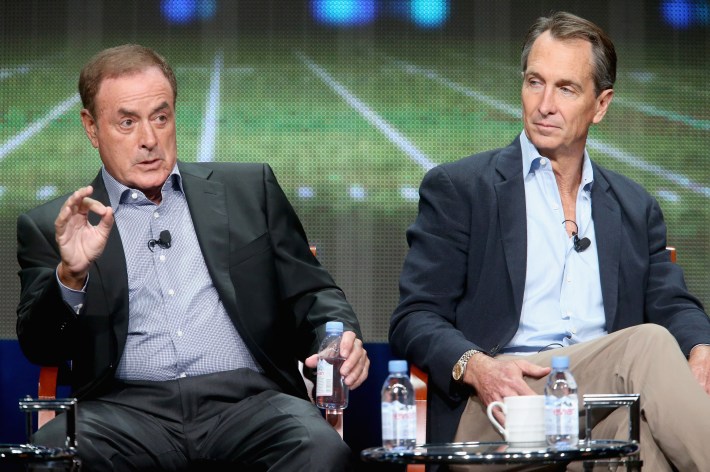
I was not wild about your Rams stadium coverage.
“What part of it? Tell me what you didn't like.”
Every time a new stadium opens in the NFL, it feels like it's the job of the broadcast crew to sing the praises of the place even though no normal people can fucking go. This is a big, beautiful facility and all that, but it feels like a monument to someone's largesse.
“Let me just make a couple of points here. This stadium was built with a lot of mainly private money. I was down there on three or four occasions during construction. There were about 2,000 people who were working there. So a lot of the $5 billion goes to paying for the labor. You've got jobs, you got a situation in Inglewood that was a place that needs some revitalization. I saw what Staples Center did for downtown Los Angeles. You're going to have several hundred people who are going to work there. So I hear what you're saying, and I'm with you when state coffers are uses for this stuff. This wasn't the case in this particular situation. You can say it's a monument to Stan Kroenke, but he paid for most of it and it's going to bring a lot of pleasure, joy, and jobs to people.”
I could mention that Kroenke received and will continue to receive enormous tax breaks and reimbursements to build his stadium, but it wouldn't matter. Al is quite fine with all this. He's PART of all this. He always has been. He’s been around long enough to see real change, but he’s also been around long enough to see youth revolutions fail. He came to prominence at a time when making the viewer at home comfortable was a genuine public service. That same comfort-giving now feels, in 2020, like a pleasant form of obfuscation. You’ve heard it all before from Al. That familiarity has been his trademark, and it’s why I like him intensely. But I’ve been around for a while now, too, and I know what familiarity usually breeds.
To that end, I ask him one last question. One final helping of steamed broccoli.
You told me that Donald Sterling was not fit to run an NBA team. Is Dan Snyder fit to run an NFL team?
“I think that he's made a lot of mistakes through the years, but I can't think of anybody who's been able to withstand more criticism. Hatred, I guess, would not be too strong a word to use. Should he be thrown out of the league? I don't see how you do that in a legal sense. I don't know. But he's not a one-off. There are guys who run teams and guys who run companies who shouldn't be running them. But they're there. They're ensconced. And what are you supposed to do at that point?”
I think this whole talk here has been about that in a much broader sense.
“Yeah!”
